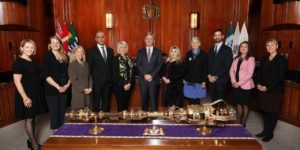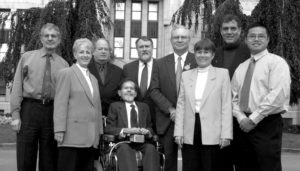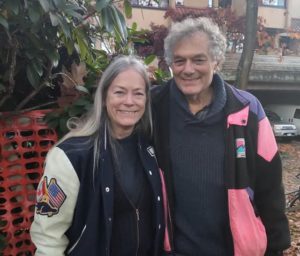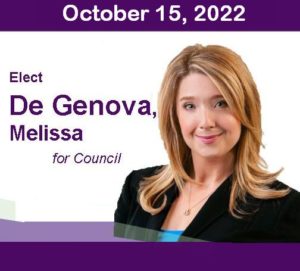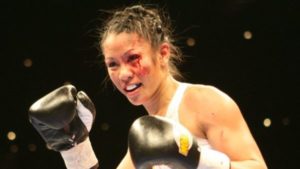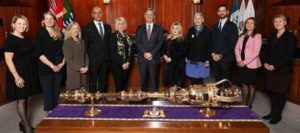
In a contentious, multi-hour meeting of Vancouver City Council, in a split vote along party lines, with COPE’s Jean Swanson, OneCity Vancouver’s Christine Boyle, all three Green Party of Vancouver City Councillors — Pete Fry, Adriane Carr, and Michael Wiebe — voting to raise property taxes in the City of Vancouver in 2022 by a whopping 6.35%, with dissenting votes coming from the former Non-Partisan Association electeds on Council — Sarah Kirby-Yung, Lisa Dominato, Colleen Hardwick, Rebecca Bligh and Melissa De Genova — arguing that Council should hold the line at a previously promised five per cent increase, at the end of a long and arduous day on Tuesday, reason and fiscal prudence did not win the day.
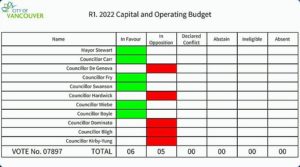
Next year’s highest in Metro Vancouver property tax increase will see much of the burden borne by small business owners as part of their triple net lease responsibilities, as well as landlords, and the much-put-upon homeowners across the city.
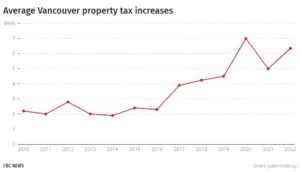
Among the more contentious parts of the debate was an amendment by Councillor Adriane Carr in which she introduced an additional $9 million per year in taxation to fund a variety of the city’s climate emergency goals.
It includes more money for more electric vehicle infrastructure, planting trees, and improving active transportation infrastructure, and comes two months after Council narrowly voted against funding similar measures through a new parking permit system. Councillor Rebecca Bligh said she supported the initiatives, but expressed concern only “some Council members” had been consulted in advance.
“It’s not popular not to support this (climate change measure), we’re likely to be called out on Twitter for not supporting this, and being called climate [change] deniers,” she told the media.
“The people who are going to vote for this, were engaged ahead of this meeting, and the people that likely are not going to vote for this, were not engaged at all.”
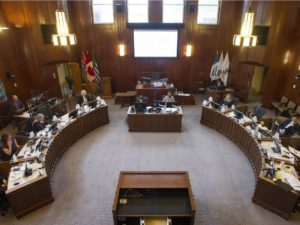 Vancouver City Council budget meeting on Tuesday, December 7 2021. Photo by Jason Payne /PNG
Vancouver City Council budget meeting on Tuesday, December 7 2021. Photo by Jason Payne /PNG
As Vancouver Sun civic affairs reporter Dan Fumano writes today …
“Property taxes will rise 6.35% in the city of Vancouver after Council narrowly approved a 2022 budget on Tuesday. After a day of debate, Council passed a $1.747 billion operating budget, with a property tax increase higher than the five per cent proposed in last month’s draft budget. Most of the additional money goes to the police, fire department and climate measures.
On a proposed $9 million fund for the climate emergency measures, the five Councillors elected in 2018 with the Non-Partisan Association — Rebecca Bligh, Melissa De Genova, Lisa Dominato, Colleen Hardwick, and Sarah Kirby-Yung — voted no. It was one of several times Tuesday the five voted together. Four have long since quit the NPA, citing concerns about its Board of Directors. Only De Genova is still with the NPA.
The other six Councillors, including the three Greens, one from OneCity, one COPE, and the independent mayor voted for the extra climate measures funding, with Stewart accusing the opponents of ignoring the climate emergency so evident in B.C. this year.”
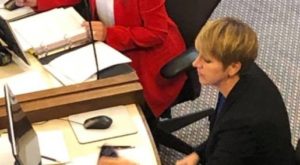 Councillor Sarah Kirby-Yung reflecting on the shenanigans going on at Council’s budget meeting
Councillor Sarah Kirby-Yung reflecting on the shenanigans going on at Council’s budget meeting
In the hour prior to the taking of the final vote on the 2022 budget, VanRamblings was afforded the opportunity to speak with Councillor Kirby-Yung.
“All members of Council are dedicated climate change activists, recognize our climate emergency, and to date every member of Council has voted in favour of meaningful climate change policy when it has come before Council,” Kirby-Yung told VanRamblings.
“To, at the last minute, add a $9 million climate measure to a City budget already stretching at the seams — when tens, and over the years working in concert with senior levels of government, hundreds of millions of dollars has been set aside as the City’s response to our climate emergency represents for me, the height of fiscal irresponsibility, and as such emerges as a disservice to the already overtaxed residents of Vancouver.”
Non-Partisan Association City Councillor Melissa De Genova also weighed in.
Breaking news‼️?
?CLIMATE LEVY?passes.
It won’t make #Vancouver more affordable. It further downloads ?onto people struggling to survive in our city.
You can thank the Mayor, Greens, COPE and OneCity for this new tax.
Money is green but it doesn’t grow on trees ? #VanPoli pic.twitter.com/EKWGKK9VU3— Melissa De Genova 鄭慧蘭 (@MelissaDeGenova) December 8, 2021
Late Tuesday evening, Councillor Kirby-Yung tweeted out these thoughts …
Voting for this budget is a broken promise to Vancouver residents, renters, homeowners, families, young people & small businesses. Mayor & Council promised taxes would 5% max. Now majority have raised taxes whopping 25%+ in 4 years. Don’t know anyone whose income has gone up 25%.
— Sarah Kirby-Yung 楊瑞蘭 (@sarahkirby_yung) December 8, 2021
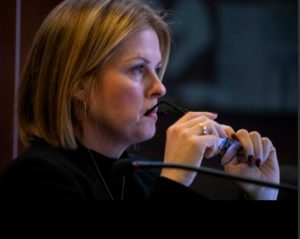 Councillor Rebecca Bligh less than pleased with the ‘game playing’ of some of her Council colleagues (Photo courtesy of CBC photographer, Ben Nelms, and CBC civic affairs reporter Justin McElroy)
Councillor Rebecca Bligh less than pleased with the ‘game playing’ of some of her Council colleagues (Photo courtesy of CBC photographer, Ben Nelms, and CBC civic affairs reporter Justin McElroy)
As CBC civic affairs reporter Justin McElroy writes …
“Despite repeated motions in the last two years to try and keep the average property tax increase at five per cent or below, the $1.7 billion budget passed has an increase of 6.3 per cent. That works out to $72 for the average detached condo in the city, or $178 for the average home, not including parts of the property tax bill not under municipal control.”
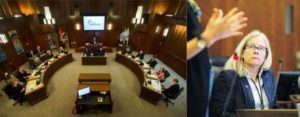 Councillor Colleen Hardwick looks askance at a Council colleague during budget debate
Councillor Colleen Hardwick looks askance at a Council colleague during budget debate
Mr. McElroy then quotes Vancouver City Councillor Colleen Hardwick …
“The stark reality is we are just going ka-ching, ka-ching, ka-ching, ka-ching, and taking it not out of the one per cent, but of the middle-class people who are trying to afford to continue living in this city.” Hardwick said at one point. “I’m choked as I continue to see us add more and more. It was bad enough that we were looking at five per cent.”
Other than the climate measures included in the 2022 budget, some of the other increases that were not originally included in the draft budget included an extra $3.1 million to Vancouver Fire and Rescue Services for more firefighters, $670,000 for enhanced street cleaning, $1.2 million to fund the newly created Auditor General’s office, and additional funding to the Vancouver Police Department, allowing them to fill current vacancies and fund recent salary arbitration decisions.
